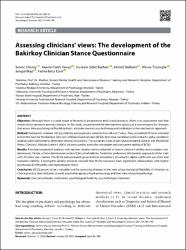| dc.contributor.author | Ulusoy, Sevinç | |
| dc.contributor.author | Yavuz, Kaasım Fatih | |
| dc.contributor.author | Burhan, Hüseyin Şehit | |
| dc.contributor.author | Nalbant, Ahmet | |
| dc.contributor.author | Terzioğlu, Merve | |
| dc.contributor.author | İlkay, Şengül | |
| dc.contributor.author | Esen, Fatma Betül | |
| dc.date.accessioned | 2021-08-03T08:24:27Z | |
| dc.date.available | 2021-08-03T08:24:27Z | |
| dc.date.issued | 2021 | en_US |
| dc.identifier.citation | Ulusoy, S., Yavuz, K. F., Burhan, H. Ş., Nalbant, A., Terzioğlu, M., İlkay, Ş. ... Esen, F. B. (2021). Assessing clinicians' views: The development of the Bakirkoy Clinician Stance Questionnaire. Düşünen Adam: The Journal of Psychiatry and Neurological Sciences, 34(2), 189-199. https://dx.doi.org/10.14744/DAJPNS.2021.00137 | en_US |
| dc.identifier.issn | 1018-8681 | |
| dc.identifier.issn | 1309-5749 | |
| dc.identifier.uri | https://dx.doi.org/10.14744/DAJPNS.2021.00137 | |
| dc.identifier.uri | https://hdl.handle.net/20.500.12511/7656 | |
| dc.description.abstract | Objective: Although there is a wide range of theoretical perspectives and clinical practices, there is no assessment tool that reveals these variations among clinicians. In this study, we presented the development process of a new measure for clinicians that assess their psychological flexibility levels, attitudes towards psychotherapy and inclination to the mechanistic approach.
Method: Participants included 167 psychiatrists and psychiatry residents from all over Turkey. They completed 29 items intended to form the basis for the Bakirkoy Clinician's Attitude Questionnaire (BCSQ). Item-total correlation and Cronbach's alpha correlation analyses were performed to determine internal consistency. The Acceptance and Action Questionnaire-II (AAQ-II) and the Mental Illness: Clinicians' Attitude Scale V.4 (MICA v4) were used to assess the convergent and concurrent validity of BCSQ.
Results: Principal component analyses with varimax rotation were conducted to ensure construct validity and to explore subdimensions. Finally, a three-dimensional version (Clinical inflexibility, Treatment preference, Mechanistic approach) of the scale with 20 items was created. The BCSQ demonstrated good internal consistency (Cronbach's alpha coefficient was 0.82) and transient stability. Convergent validity analyses showed that BCSQ subscales have significant relationships with higher psychological inflexibility and stigmatization levels.
Conclusion: BCSQ proves to be a valuable tool for assessing changes in the level of psychological flexibility of clinicians in clinical practice, their attitudes towards psychotherapy/psychopharmacology and their view of psychopathology. | en_US |
| dc.language.iso | eng | en_US |
| dc.publisher | Kare Publishing | en_US |
| dc.rights | info:eu-repo/semantics/openAccess | en_US |
| dc.subject | Clinician Attitudes | en_US |
| dc.subject | Mechanism | en_US |
| dc.subject | Psychological Flexibility | en_US |
| dc.subject | Psychotherapy | en_US |
| dc.subject | Treatment | en_US |
| dc.title | Assessing clinicians' views: The development of the Bakirkoy Clinician Stance Questionnaire | en_US |
| dc.type | article | en_US |
| dc.relation.ispartof | Düşünen Adam: The Journal of Psychiatry and Neurological Sciences | en_US |
| dc.department | İstanbul Medipol Üniversitesi, İnsan ve Toplum Bilimleri Fakültesi, Psikoloji Bölümü | en_US |
| dc.authorid | 0000-0003-3862-2705 | en_US |
| dc.identifier.volume | 34 | en_US |
| dc.identifier.issue | 2 | en_US |
| dc.identifier.startpage | 189 | en_US |
| dc.identifier.endpage | 199 | en_US |
| dc.relation.publicationcategory | Makale - Uluslararası Hakemli Dergi - Kurum Öğretim Elemanı | en_US |
| dc.identifier.doi | 10.14744/DAJPNS.2021.00137 | en_US |


















